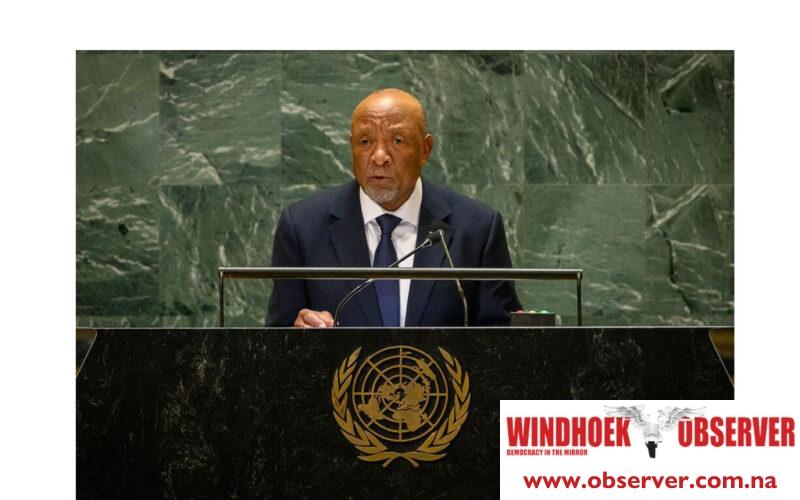Niël Terblanché
In his address at the 79th Session of the United Nations General Assembly (UNGA), President Nangolo Mbumba delivered an address centred on Namibia’s commitment to sustainable development, multilateralism, and justice.
Mbumba stressed the importance of global cooperation in tackling the pressing challenges of climate change, conflict, and economic inequities, while also advocating for African representation in international governance bodies such as the UN Security Council.
“Namibia is deeply affected by climate change and is experiencing severe environmental consequences that have disrupted fisheries and agriculture, especially under the El Niño phenomenon,” he told the world leaders assembled in New York
Mbumba informed participants at the session how Namibia had to declare a State of Emergency to address the effects of drought, stressing the urgency of global climate action.
He called for developed countries to increase support for developing nations, not only to facilitate energy transitions but also to ensure economic development is compatible with combating climate change.
Concerning the international stage, Mbumba’s address echoed the overarching theme of the UNGA’s 79th session—“Leaving no one behind: acting together for the advancement of peace, sustainable development, and human dignity”.
His remarks aligned with the session’s focus on the necessity of global solidarity to address crises such as climate change, geopolitical tensions, and poverty.
In addition to climate issues, President Mbumba expressed Namibia’s commitment to gender equality, pointing out that Namibia is among the top nine countries globally in closing the gender gap, with recent strides toward equal representation in the National Assembly.
As Namibia prepares for its national elections in November 2024, we will endeavour to continue this progress by nominating several female candidates for key positions in the governing structures of Namibia,” he said.
On peace and security, Mbumba made an ardent plea for the global community to act on the ongoing conflict in Gaza.
Drawing parallels with Namibia’s history, he condemned the actions of Israel, describing them as genocidal.
He also called for an end to the economic blockades against Cuba and Zimbabwe, advocating for the principles of inclusivity and fairness that the UN is meant to uphold.
Mbumba’s speech also reflected Africa’s broader push for greater global representation.
He pointed out that multilateral institutions, especially those created post-1945, no longer meet the needs of the African continent.
His call for reform of the Security Council also resonated with ongoing discussions about ensuring Africa has a stronger voice in global decision-making forums.
The president’s address did fit seamlessly into the broader discussions at UNGA 79, which focused on accelerating action towards the Sustainable Development Goals (SDGs) and addressing global inequalities.
I call for a collective, inclusive global response to these challenges,” he said while reinforcing Namibia’s role as a key advocate for justice, peace, and sustainability on the global stage.




